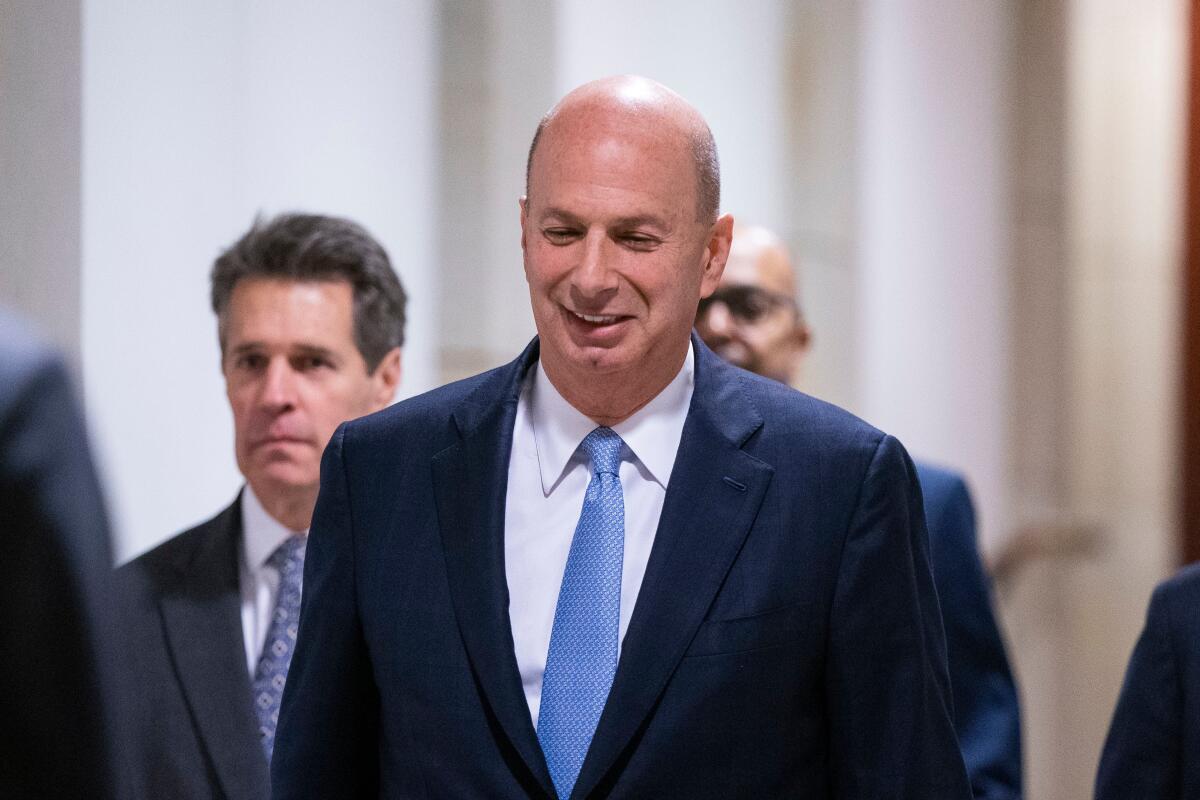Gordon Sondland’s impeachment testimony was beyond damning. Will it matter?

- Share via
Even before Gordon Sondland testified publicly Wednesday in the House impeachment inquiry, investigators had assembled a persuasive if circumstantial case that President Trump abused his power to prod Ukraine to conduct investigations that would benefit Trump politically — just as the unnamed whistleblower contended. But Sondland, the U.S. ambassador to the European Union, strengthened that case immeasurably with his testimony, which had added weight because he is a Trump political appointee who can’t be accused of being part of a sinister “deep state.”
The events Sondland recounted dovetailed with what previous witnesses had revealed. He testified that there was indeed a “quid pro quo” involved in Ukraine policy: Ukrainian President Volodymyr Zelensky would not get the coveted White House visit he was promised unless he announced investigations into a Ukrainian energy company for which former Vice President Joe Biden’s son served as a director and into a conspiracy theory that Ukraine, not Russia, interfered in the 2016 U.S. election. In an important revelation, Sondland said he also concluded from all he was hearing that, as surely as “two plus two equals four,” U.S. security aid was being held up as well in order to pressure Ukraine into announcing those investigations.
There was more: Sondland made it clear that Trump had expressly directed him and other U.S. officials to work with Rudolph W. Giuliani, Trump’s personal lawyer, who has agitated for a Ukrainian investigation of the Bidens and who was Trump’s emissary on the demand for a quid pro quo. “We did not want to work with Mr. Giuliani,” Sondland testified. “Simply put, we played the hand we were dealt.”
Finally, Sondland testified that his efforts and Guiliani’s weren’t the result of a rogue foreign policy. Instead, he said, important officials in the administration — including Secretary of State Michael R. Pompeo and acting White House Chief of Staff Mick Mulvaney — were “in the loop” about the pressure campaign.
What emerges from his testimony and that of other witnesses is an all too believable picture of a foreign policy process hijacked by the president’s willingness to use the powers of his office to benefit his domestic political interests.
Republicans on the Intelligence Committee argued that Sondland’s testimony wasn’t a smoking gun because he couldn’t cite any conversation in which Trump had told him that there was a quid pro quo. The president himself pointed reporters to a Sept. 9 telephone call in which Trump, Sondland testified, told him that “I want nothing” from Ukraine and forswore any quid pro quo. But that call took place after the whistleblower complaint was filed, and on the same day Congress announced an investigation of whether there was a quid pro quo. The timing of Trump’s denial makes it suspect, to say the least.
Moreover, the idea that Trump wanted nothing from Ukraine conflicts with what remains the most incriminating evidence against the president: the reconstructed transcript of the president’s July 25 telephone call with Zelensky in which, after noting that “we do a lot for Ukraine,” Trump suggested that Ukraine “do us a favor.” He asked Zelensky to investigate a conspiracy theory linking Ukraine to hacked Democratic emails and suggested that he talk with Atty. Gen. William Barr about rumors that Biden as vice president had forced the firing of a Ukrainian prosecutor widely viewed as corrupt in order to protect Hunter Biden. Both ideas emanated from discredited Ukranian sources, some of whom have since recanted the allegations that Giuliani had fed to Trump.
Significantly in light of Sondland’s testimony, Trump in that call said it “would be great” if Zelensky would speak to Giuliani.
An array of witnesses, including Sondland, have provided the larger context in which that conversation — which Trump has defended as “perfect” — must be viewed. The fact that the administration has blocked the testimony of witnesses in close contact with Trump, such as Mulvaney or former national security advisor John Bolton, is outrageous. Trump himself should testify, as he suggested this week he might.
But let’s be clear. Even without such testimony, the House committee has pieced together a plausible and damning narrative, and Trump’s defenders are forced to rely on utterly incredible arguments. They include the laughable idea that Trump might have a principled objection to corruption in Ukraine (or anywhere else) and the “all’s well that ends well” defense: The administration ultimately released the aid for Ukraine — after the whistleblower complaint was filed and Congress started looking into the delay.
The testimony will go on, and some point the House may decide that Trump’s abuse of power justifies the extraordinary step of impeachment. But even if the president is impeached, the servility of congressional Republicans makes it unlikely that he would be convicted by the Senate and removed from office before the end of his term. That means his corrupt and chaotic presidency must be brought to a merciful end next year, at the ballot box.
More to Read
A cure for the common opinion
Get thought-provoking perspectives with our weekly newsletter.
You may occasionally receive promotional content from the Los Angeles Times.









